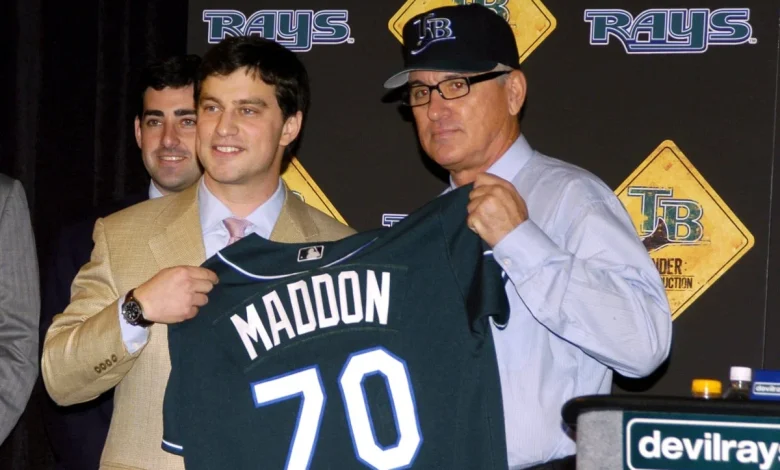I worked with the Dodgers’ Andrew Friedman for years. These two leadership traits stood out

Editor’s note: This story is part of Peak, The Athletic’s desk covering leadership, personal development and performance through the lens of sports. Follow Peak here.
Former MLB manager Joe Maddon worked with Andrew Friedman, the Dodgers’ president of baseball operations, for nine seasons with the Tampa Bay Rays. Friedman and the Dodgers just won their second consecutive World Series and third in six years.
My favorite story about Andrew Friedman has nothing and everything to do with our relationship.
When Andrew and the Tampa Bay Rays hired me to be the team’s manager for the 2006 season, he and I went out a lot. Hell, we’d go out at night during spring training. We’d laugh, we’d giggle, we’d talk baseball. It was wonderful.
Then we went to Boston, and he found this really intimate, trendy sushi joint that I would have never known about. It was one of those places where you sit down and they just start serving you. We sat there, just him and I in this little place. I have a great photograph somewhere of us together at the bar. That night is one I’ll always remember because we really bonded.
From a distance, Andrew might seem a little reserved or a little robotic. He is really sharp; I think that’s obvious. He worked at Bear Stearns and in private equity before he joined the Rays. But Andrew can really straddle the analytics and human side of baseball, and there were two leadership traits I appreciated about him during our nine years together:
- He intentionally challenged people’s ideas to create a conversation.
- He was a great listener.
I had my first interview with Tampa Bay during the 2005 World Series in Houston. Andrew was in a little hotel conference room, and the whole time, he looked right at me. I could tell he was in every word and really listening.
It’s not only a great leadership quality, it’s a great human quality. Trust me, he listens to everything you say. Not that he’s going to agree – a lot of times he would disagree – but that’s not what mattered. When you speak with somebody in a leadership position and you believe that they’re giving you their unfiltered and undivided attention, that’s what matters.
If you want to extrapolate the best out of somebody who works for you, become a good listener. Nothing will impress them more.
When I got to Tampa Bay, I brought with me a card system. It was a card of information – my version of analytics as it existed at the time. I did all the work myself. I’d look up stats and put on my card whatever information I thought was important before a game or series.
Andrew would come into my office and watch me go through this process all the time. He wouldn’t say anything; he’d just watch. And then finally he came up to me and said: “Listen, you’re wasting a lot of time with that, and you can spend that time doing something else. We can do that for you. Show me what you need and want, and we’ll get that done for you.”
I didn’t ask him or mention it to him; it was just something he watched me do.
Before the 2008 season, I came up with an esoteric idea for our team: 9 = 8. It meant: 9 players playing 9 innings hard can make us one of the 8 teams in the playoffs.
The year before, we had won just 66 games. I needed to find a way to sell to our players that we could be a playoff team in 2008. I was riding my bike in California one day, and I remembered something I had read about players writing their intentions for the day on an index card when they walked in a room. Esoteric, I thought. So I’m riding my bike, and I don’t know why but I started thinking: 9 players, 9 innings, 8 teams in the playoffs. And then all of a sudden I just thought: 9 = 8. I started to extrapolate that. I wanted 9 more wins out of the offense, 9 more wins out of the defense, 9 more wins out of the pitching staff. I didn’t even know how that would work, but I thought it sounded good.
I got back from my bike ride, and I was so jacked up that I called Andrew. I said, “Andrew, what do you think about this as a way to motivate the group and give us direction?” I told him the whole thing. And his comment to me was, “I love it.”
Imagine the confidence I had to follow up on that. Andrew loved it. That created all the momentum for me. He liked new things, new thoughts and ideas, and he understood, beyond his ability with data and analytics, the human side of things.
He would also challenge people. Sometimes he would intentionally take the other side of an argument to see if you were really convicted in what you were saying, or if you were easily swayed.
We’d talk about lineup construction. He may have agreed with me completely, but he’d say, “What do you think about hitting this guy second and this guy fourth? Don’t you think that’s a better idea?” He would just test me to see how convicted I was.
During my first couple of years in Tampa, I wasn’t so concerned with bullpen matchups because we didn’t have very good bullpen arms. I thought it was almost useless to match pitchers up; I was just trying to go with the best pitcher. But he argued against that. Eventually, I started to move in that direction because he told me it was done for a reason and they believed in it. Andrew taught me a lot about how analytics works and how I could use it to make better decisions in the game.
One year, we acquired an infielder named Logan Forsythe. Andrew told me the thing that really attracted them to Logan was his exit velocity. His numbers were not good, but they found out he hit the ball really hard. He was just kind of unlucky.
A reporter asked me about Logan, and I brought up exit velocity, which was not a popular stat at the time. Andrew caught wind of that and, man, he got on me real fast to not spread proprietary information. I didn’t even know it was. I just thought it was interesting. He jumped my ship, and I told him, “You’re right. I’ll be more careful.”
And guess what? He was right about Logan Forsythe.
Maybe once or twice we got heated, but for the most part, our conversations were adversarial in the most civil sense. I’ve met Andrew’s mom, Barbara. She is such a warm, positive person. She is all spirit and soul. You don’t get raised by a woman like that and not have a real soul about you — and Andrew does.
He was always open-minded. He never thought he was always right. He seemed to know that he didn’t know everything, and that’s a really important part of growth.
His approach permeated the culture. I’m not surprised he’s done the same with the Dodgers.
— As told to Jayson Jenks





